|
|
|
Sort Order |
|
|
|
Items / Page
|
|
|
|
|
|
|
| Srl | Item |
| 1 |
ID:
145875
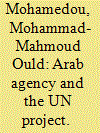

|
|
|
|
|
| Summary/Abstract |
Discussion of the contemporary Arab state system overlooks the engagement of the nascent League of Arab States with the debates about world politics and the purposes of the UN system emerging from World War II. The early experience of that body did not articulate a full expression of universalism, and the integrative cooperation of the Arab League was confined to a limited security policy framework. It did not subsequently seek lastingly to influence the nature of those ideas and institutions that would come to shape the United Nations. The Arab League was also never wedded to a Global Southern logic. Yet the UN has seldom been disavowed in the League’s diplomatic processes, which have been used by member states tactically as a conduit to maximise regional interpretations of the challenges from global order and as a forum for advancing the sub-region’s provincial interests.
|
|
|
|
|
|
|
|
|
|
|
|
|
|
|
|
| 2 |
ID:
140846
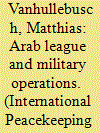

|
|
|
|
|
| Summary/Abstract |
The humanitarian crisis in Syria has triggered diverse questions on the role of the international community and regional actors – in particular the Arab League – to assume their responsibility in matters of peace and security. Military interventions in past conflicts show proof that the Arab League has the military and doctrinal capacity to justify and accommodate their deployment in its member states and to contribute to international peace and security as envisaged under the UN Charter. A blueprint on future operationalization of military operations under its flag examines the relevant laws which they have to respect.
|
|
|
|
|
|
|
|
|
|
|
|
|
|
|
|
| 3 |
ID:
111592
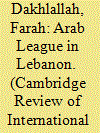

|
|
|
|
|
| Publication |
2012.
|
| Summary/Abstract |
Contrary to expectations, the Arab League has emerged as an active player in the Middle East region over the past decade. The League's roles in negotiations to end the 2006 Israel-Lebanon War and in the brokering of the 2008 Doha Agreement between warring Lebanese factions present two instances of 'partial' and 'direct' contributions to success in resolving major extra-systemic and minor internal conflicts. These developments are part of a global trend of the regionalization or decentralization of security in the post-Cold-War context.
|
|
|
|
|
|
|
|
|
|
|
|
|
|
|
|
| 4 |
ID:
111735
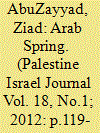

|
|
|
|
|
| Publication |
2012.
|
| Summary/Abstract |
The recent decision of the Arab League foreign ministers (Nov. 12, 2011) to suspend Syria's membership in the Arab League was interpreted by observers as the last act before international intervention in Syria; the same had happened earlier in Libya. But the Arab League's decision came after Syrian President Bashar al-Assad failed to understand the course of events in his country in light of what had happened in other rebelling Arab countries, leaving the Arab League countries with no option but to ask the Security Council to adopt the Arab initiative and impose sanctions against the Syrian regime. Such a decision by the Arab League in the past opened the door for NATO intervention in Libya and eventually may serve to allow outside intervention in Syria as well.
|
|
|
|
|
|
|
|
|
|
|
|
|
|
|
|
| 5 |
ID:
156718
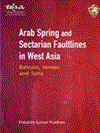

|
|
|
|
|
| Publication |
New Delhi, Pentagon Press, 2017.
|
| Description |
xii, 157p.hbk
|
| Standard Number |
9789386618054
|
|
|
|
|
|
|
|
|
|
|
|
Copies: C:2/I:0,R:0,Q:0
Circulation
| Accession# | Call# | Current Location | Status | Policy | Location |
| 059232 | 320.56/PRA 059232 | Main | On Shelf | General | |
| 059233 | 320.56/PRA 059233 | Main | On Shelf | General | |
|
|
|
|
| 6 |
ID:
131235
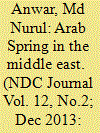

|
|
|
| 7 |
ID:
119003
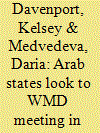

|
|
|
| 8 |
ID:
173974
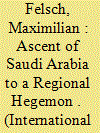

|
|
|
|
|
| Summary/Abstract |
After the Arab upheavals that began in 2011, Saudi Arabia became the most dominant power in the Arab world. While most of its Arab rivals experienced political and economic crises and disintegration, the Gulf monarchy began an unprecedented active and even interventionist foreign policy and increased its regional influence tremendously. Remarkably, most of this activism was not exercised unilaterally but within regional institutional frameworks, mainly of the League of Arab States (LAS) and the Gulf Cooperation Council (GCC). This article investigates how Saudi Arabia gained institutional power within the LAS. The analysis is based on the LAS decisions at the Summit level before and after the Arab uprisings with regard to Saudi Arabia’s main foreign policy interests. The purpose of the article is to examine the essence of Saudi Arabia’s regional power. It also looks at the unforeseen revitalization of the LAS and allows predictions of the future of Arab regionalism in a changing Arab world.
|
|
|
|
|
|
|
|
|
|
|
|
|
|
|
|
| 9 |
ID:
172447
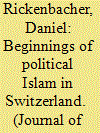

|
|
|
|
|
| Summary/Abstract |
When the Muslim Brotherhood (MB) was banned in Egypt in 1954, many of its followers and leaders found refuge and support in conservative Islamic countries, most notably in Saudi Arabia and Jordan. In the late 1950s, a Saudi diplomat approached the Swiss authorities with plans to open an Islamic Center in Geneva. From the beginning, the Swiss authorities welcomed the project, because it was supported by several pro-Western Arab countries, which opposed Egypt under Nasser. Swiss-Egyptian relations had been strained for some years because of Nasser’s socialist policies and Egypt’s espionage and propaganda operations in Switzerland. The Islamic Center eventually opened in 1960, and was headed by Said Ramadan, an exiled leader of the Muslim Brotherhood. Egyptian officials tried to thwart the Center’s activity and competed with it over influence on the small Arab student body then residing in Switzerland. As a politically active foreigner, the Swiss looked with suspicion on Ramadan. Still, they felt sympathy for his anti-Nasserist and anti-Communist stance, ignoring internal reports revealing the anti-Western and anti-Semitic nature upon his ideology. After 1966, the Swiss Ministry of Foreign Affairs believed Nasser’s Arab nationalism to be in terminal decline, expecting that Islamists might soon come to power in the Middle East. As a result, they decided to allow Ramadan and his family to remain in Switzerland despite overstaying their residence permits. This article sheds light on the founding years of the MB in Europe, a development still largely unchartered by historians, and the reaction of the Swiss to the appearance of a new phenomenon in Europe: political Islam. It argues that the context of Swiss-Egyptian relations is essential for understanding Swiss actions toward the Muslim Brotherhood.
|
|
|
|
|
|
|
|
|
|
|
|
|
|
|
|
| 10 |
ID:
177571
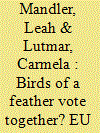

|
|
|
|
|
| Summary/Abstract |
UN General Assembly (UNGA) voting is non-binding, unlike voting in the Security Council (UNSC), yet is considered to reflect states’ interests. This article attempts to explore, compare, and explain patterns in UNGA voting of two regional organisations (ROs) on Israel-related resolutions, and/or issues that are of importance to Israel. Israel has been a unique case when it comes to the UN, which has shown pervasive hostility towards the Jewish state over the past decades (e.g. 83 of the 97 UNGA resolutions criticising countries in 2012–15 [or 86%] were directed against Israel). While most researchers agree that ROs differ in the level of their group vote uniformity, this article argues that states’ voting on resolutions related to Israel also varies within ROs and over time. As such, it sheds light on internal changes within the examined ROs (the Arab League and the EU) and shows important differences among members of these organisations.
|
|
|
|
|
|
|
|
|
|
|
|
|
|
|
|
| 11 |
ID:
089116
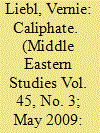

|
|
|
|
|
| Publication |
2009.
|
| Summary/Abstract |
The Caliphate was abolished 85 years ago; there have been several attempts to resurrected it since. What is the potential for a restoration of the caliphate? A new caliphate was declared in Ramadi in mid-2006 by Islamic insurgents before being quickly crushed by the Iraqi government. Just what exactly is a caliphate, who says there is one or who wants one (for example, both the Americans and Islamists have views on the caliphate) and the ideological justifications for one. Where and how did the caliphate begin, what are the prerequisites to be caliph (according to Muslim sources) and were or are there troubles in the succession? Has there been more than one caliphal dynasty? Who are the heirs, pretenders and illegitimate claimants? Where do such families such as the Moroccan Alaouite royal family, the House of Osman, the exiled-Nizamat of Hyderabad and the Hashemite dynasty of Jordan fit in? Despite there not being a 'legally' recognized Caliphate today, there are existing proto-caliphate structures, such as the Arab League and the Organization of the Islamic Conference. There are also legitimizing legal foundations, such as declarations recorded by the 1926 al-Azhar Caliphate Conference, enabling the possibility of a modern restoration of a caliphate.
|
|
|
|
|
|
|
|
|
|
|
|
|
|
|
|
| 12 |
ID:
121708
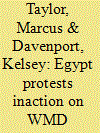

|
|
|
|
|
| Publication |
2013.
|
| Summary/Abstract |
The Egyptian delegation walked out of a meeting of member states of the nuclear Nonproliferation Treaty (NPT) on April 29 to protest the failure to convene a conference on creating a zone free of weapons of mass destruction (WMD) in the Middle East, and an Egyptian Foreign Ministry official said May 17 that other steps may follow.
|
|
|
|
|
|
|
|
|
|
|
|
|
|
|
|
| 13 |
ID:
111734


|
|
|
|
|
| Publication |
2012.
|
| Summary/Abstract |
The Arab Peace Initiative (API) of March 2002 was intended to revolutionize the Middle East. The new regional agenda offered by the 22 countries of the Arab League represented a historical paradigmatic shift in the relations between Israel and the Arab world. More than a century of conflict between the Arab world and the Zionist movement were to come to an end. If we were to summarize the provisions laid out in the League's decision in Beirut, the fundamental principles are quite simple: All Arab countries would normalize their relations with Israel in return for full Israeli withdrawal from the Golan Heights, the Gaza Strip and the West Bank (including East Jerusalem). An independent Palestinian state would be established, and a just and agreed solution would be found for the Palestinian refugee problem, in accordance with Resolution 194 of the United Nations General Assembly. All Arab countries would consider the Arab-Israeli conflict to be over and done, enter into peace agreements with Israel and provide security to all countries of the region. All League members accepted the proposal, and it was also endorsed by all 57 states of the Organization of Islamic Cooperation (all Muslim countries) at their meeting in Tehran.
|
|
|
|
|
|
|
|
|
|
|
|
|
|
|
|
| 14 |
ID:
120693
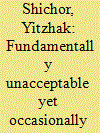

|
|
|
|
|
| Publication |
2013.
|
| Summary/Abstract |
China's 'non-interference' policy is not a new phenomenon. It originates in pre-modern Chinese history when the Empire had been isolated from the rest of the world, as well as in the Mao era when the Chinese-even if they had the will to interfere-did not have the capabilities. Post-Mao and post-Cold War, China has the capabilities but not yet the will to become more involved. Still, economic prosperity and growing political prominence have forced Beijing to compromise. Fundamentally, China's first option remains 'non-interference' and settling of conflicts by the parties concerned. Yet if this fails, then the Chinese prefer an intervention by a regional or professional organisation. If this attempt too, fails, then, reluctantly, Beijing turns to the United Nations Security Council as an option. The worst option is external and independent intervention. All these options are evident in China's Middle East policy.
|
|
|
|
|
|
|
|
|
|
|
|
|
|
|
|
| 15 |
ID:
111721


|
|
|
|
|
| Publication |
2012.
|
| Summary/Abstract |
Nothing, it seems, is quite what it seems. If even illustrious experts spectacularly failed to foresee the seismic shifts engulfing the Arab world, how is the ordinary observer supposed to make sense of events? How may we distinguish fact from fiction, wheat from chaff, real value from face value?
Turning to the political class for answers is no panacea, for insight and prescience are hardly their strong suits, either. Take Israeli Prime Minister Binyamin Netanyahu: no sooner had he boasted "there is only one country in the whole of the Middle East that has no troubles, no protests - that's Israel," than his country's social protest movement erupted beneath him.
|
|
|
|
|
|
|
|
|
|
|
|
|
|
|
|
| 16 |
ID:
170729
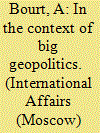

|
|
|
| 17 |
ID:
123232
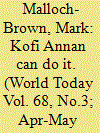

|
|
|
| 18 |
ID:
031912


|
|
|
|
|
| Publication |
Princeton, Princeton University Press, 1965.
|
| Description |
xiii, 407p.
|
|
|
|
|
|
|
|
|
|
|
|
Copies: C:1/I:0,R:0,Q:0
Circulation
| Accession# | Call# | Current Location | Status | Policy | Location |
| 012605 | 341.2477/MAC 012605 | Main | On Shelf | General | |
|
|
|
|
| 19 |
ID:
128189


|
|
|
|
|
| Publication |
2013.
|
| Summary/Abstract |
An Israeli-Palestinian peace agreement could neutralize the Iranian nuclear peril and allow the long-term possibility of making the ME a nuclear weapons-free zone, Israel included.
|
|
|
|
|
|
|
|
|
|
|
|
|
|
|
|
| 20 |
ID:
114965
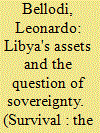

|
|
|
|
|
| Publication |
2012.
|
| Summary/Abstract |
In mid-February 2011, after popular revolts had overturned governments in Tunisia and Egypt, the so-called 'Arab Spring' reached the coasts of Libya. Protests against the decades-long rule of Colonel Muammar Gadhafi broke out in several Libyan cities and quickly gathered momentum, despite the efforts of the country's security forces to contain them. On 27 February, the leadership of the anti-Gadhafi movement, based in the eastern Libyan city of Benghazi, formed an interim National Transitional Council (NTC), which immediately declared itself the sole representative of the Libyan people. But although the uprisings in Tunisia and Egypt were quick and relatively bloodless, in Libya, the confrontation between Gadhafi's regime and the insurgents rapidly turned into an armed conflict.
|
|
|
|
|
|
|
|
|
|
|
|
|
|
|
|
|
|
|
|
|